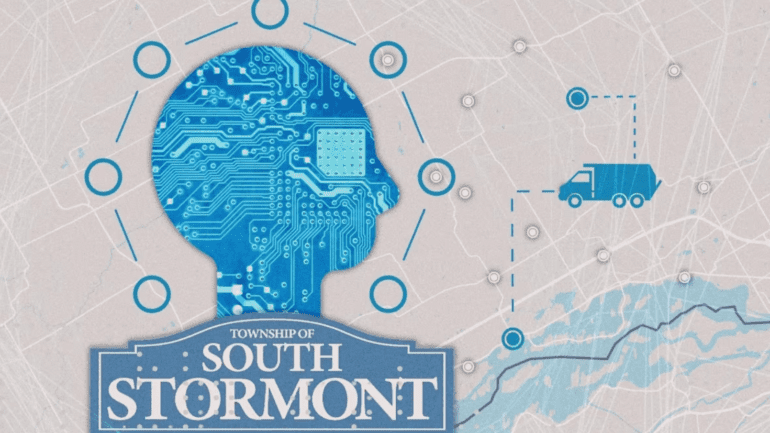TL;DR:
- South Stormont, a rural township in eastern Ontario, is embracing AI to enhance its garbage collection efficiency.
- The township partners with Amb.AI through a memorandum of understanding (MOU) to optimize vehicle utilization.
- AI generates optimal routes for garbage trucks and snow plows, improving operational efficiency.
- The pilot project aims to save costs on fuel and work hours in the long run.
- Canadian municipalities, like South Stormont, explore AI’s application to traditional services.
- Responsible AI integration requires assessment, ethical alignment, and data ownership clarification.
- AI’s potential varies among cities, with larger ones like Edmonton leading in proactive integration.
- AI offers a toolkit from predictive analytics to generative models like ChatGPT.
- Municipalities must consider impact assessment and standards for successful AI integration.
- South Stormont’s innovation showcases calculated AI adoption for enhanced municipal efficiency.
Main AI News:
The picturesque rural township of South Stormont in eastern Ontario, nestled along the banks of the St. Lawrence River northwest of Cornwall, is poised to step into the future of waste management through the power of artificial intelligence (AI). With a sprawling expanse covering over 300 kilometers of roads, the Township ensures a weekly garbage pickup for its residents. However, the challenge lies in addressing complaints about missed pickups, which constitute the majority of grievances lodged by the community. Mark Zoppas, the township’s dedicated public works supervisor, shared insights into this persistent issue.
Recognizing the need for enhanced efficiency and cost-effectiveness, the Township of South Stormont is venturing into uncharted territory by collaborating with Amb.AI, a Saskatoon-based AI firm. This visionary partnership was formalized through a memorandum of understanding (MOU) approved by the township council in late May. The MOU articulates the township’s aspiration to optimize the allocation of its vehicle fleet, leading to improved financial and environmental efficacy.
Underpinning this groundbreaking endeavor is a sophisticated AI-driven program that leverages inputs ranging from road network specifics to vehicle availability. By assimilating this data, the AI system generates the most optimal routes for garbage collection trucks and snow plows. Mohammed Alsharqawi, the township’s director of public works, illuminated the transformative potential of this technology. The program not only streamlines operations for the workforce but also maps out an efficient journey across the entire region, optimizing travel paths.
Despite the trailblazing nature of this AI integration, the Township of South Stormont remains vigilant in its fiscal approach. The pilot project itself incurs no financial burden, fostering optimism that long-term gains will outweigh the initial investments. The anticipation centers on substantial savings in fuel consumption and work hours, ultimately boosting the township’s financial resilience.
This venture aligns with a broader trend among Canadian municipalities, as AI disrupts conventional paradigms. South Stormont joins a cohort of innovative local governments exploring AI’s application to traditional services. Renowned professor Renée Sieber, who tracks AI adoption in Canadian municipalities, noted the nuanced dynamics shaping this transformation. While some municipalities display a cautious demeanor, she lauds their responsible technology implementation.
Sieber’s insights delve into the diversity of AI adoption in the Canadian context. While larger cities like Edmonton are exemplars of proactive AI integration, smaller localities encounter unique challenges. Funding constraints and a focus on immediate needs, such as road maintenance, often delay investment in sophisticated AI algorithms. Sieber underscores the need for meticulous evaluation, intellectual property delineation, and audit processes to ensure the technology aligns with ethical and operational parameters.
Indeed, AI represents an expanding toolkit for cities seeking to enhance service delivery. It spans from predictive analytics, akin to machine learning, to the advanced realms of generative models, such as ChatGPT. Amidst this spectrum, the Township of South Stormont’s AI-driven waste collection algorithm manifests as a pragmatic innovation that augments municipal efficiency without delving into the complexities of generative AI.
Sieber reinforces the significance of algorithmic impact assessments, which validate the technology’s efficacy and ethical compliance. Establishing standards, clarifying data ownership, and safeguarding against unexpected algorithmic entanglements emerge as best practices for responsible AI integration.
As South Stormont takes confident strides toward AI-powered excellence, their forward-thinking approach showcases how embracing innovation can enhance a municipality’s standing and reputation. Mike Melinyshyn, CFO and director of corporate services and innovation at the Town of Innisfil, attest to the transformative benefits of pioneering technologies. Innisfil’s adoption of AI-driven sensor technology in garbage collection exemplifies the fusion of innovation and efficiency.
In an era marked by evolving challenges and opportunities, AI emerges as a transformative force that necessitates careful evaluation. The potential pitfalls, ranging from biased algorithms to job displacement, highlight the multifaceted considerations inherent in AI integration. Sieber’s reminder that not every problem requires an AI solution underscores the need for discernment and strategic decision-making.

An aerial view of the proposed Innisfil Orbit, a planned neighbourhood that would be built in concentric rings around a central GO transit station. Before the Orbit can become a reality, Innisfil is experimenting with technology ranging from cryptocurrency to AI. Source: Town of Innisfil
Conclusion:
The strategic adoption of AI in South Stormont’s waste management highlights the evolving landscape of municipal services. This forward-thinking approach serves as a microcosm of how responsible AI integration can optimize operations while maintaining community values. As Canadian municipalities increasingly explore AI, their ability to balance innovation, efficiency, and ethical considerations will define the trajectory of the AI solutions market in the broader landscape.

